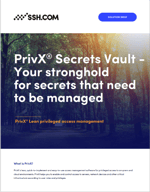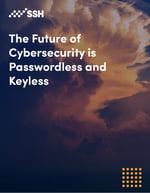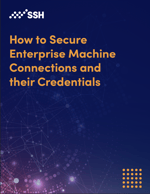Solutions
Manage secrets your way
Tokens, passwords, certificates and encryption keys all open access to mission-critical information in IT environments. Managing these secrets is a top priority.
At the same time, IT environments are a mix of old and new technologies (like data centers and cloud services, Linux, Unix and Windows environments), creating complex hybrid environments for secrets and credentials management.
There is no one-size-fits-all solution.
We offer you a best-of-all-worlds solution to manage your secrets. Manage, vault and rotate the credentials you still have to, while building a path to a future with passwordless authentication and passwordless, keyless SSH.
The future of authentication is passwordless
Passwords have been rotated and managed for decades. Yet they continue to pose security risks. It's time to say goodbye to permanent credentials and always-on authorization. Here's how you still manage your legacy environments while paving the way to the future:
![]() Stop password sprawl
Stop password sprawl
Store passwords to an encrypted & secret vault
![]() Reduce risk
Reduce risk
Obfuscate shared account passwords
![]() Automate rotation
Automate rotation
Manage and rotate passwords
![]() Just-in-time Zero Trust access
Just-in-time Zero Trust access
Go passwordless
The future of SSH is passwordless and keyless
SSH encryption keys are access credentials just like passwords. They often outnumber passwords 10 to 1 in IT environments but are typically unmanaged. If you control all your passwords, you only manage 20% of your critical credentials if SSH keys are rogue. This is how you go passwordless and keyless in SSH:
![]() Find keys gone wild
Find keys gone wild
Scan & discover keys
![]() Reduce risk
Reduce risk
Eliminate at-risk Keys
![]() Automate
Automate
Control key lifecycle
![]() Minimize complexity
Minimize complexity
Become keyless with Zero Trust
Passwords = Keys = Permanent credentials
1. SSH Keys are like passwords - but 10 times more common
SSH encryption keys are just as important access credentials as passwords but 10 times more prevalent. That's why they require robust provisioning and termination processes and audit attention.
2. Keys and passwords are regulated and an IT audit failure point
Auditors and regulations require that both SSH encryption keys and passwords are used responsibly. Applicable regulations include PCI-DSS, Sarbanes-Oxley (SOX), HIPAA, and NISTIR 7966.
3. Keys and passwords are used ungoverned
Many Privileged Access Management (PAM) solutions don't handle SSH Keys. When vaulted, this typically accounts for only 20% of keys. Both keys and passwords are shared and managed without a centralized way to manage both.
4. Managing is good, credential-less is better
Vaulting, rotating and managing encryption keys and passwords is still necessary in many cases. But keyless, passwordless SSH and passwordless authentication reduces your risks and massively streamlines your management needs. We can help you with both with our hybrid approach.
Permanent credentials add risk and costs
80%
According to the Verizon Data Breach Report, 80% of hacking-related breaches involve brute force or the use of lost or stolen credentials. Passwords and permanent credentials are still the easiest ways to penetrate your security systems.
1 million USD
According to Forrester, this is the annual allocation for password-related support costs in a large US company. Gartner says that 20-50% of all IT help desk tickets are for password resets.
71%
According to a Vanson Bourne study, 71% of IT pros experience issues with access management that slows down their daily work. 85% share account credentials out of convenience, even though most (70%) understand the risks.
Passwordless is urgent
The Gartner Emerging Technologies and Trends Impact Radar places passworldess authentication as the top priority for organizations this year.












